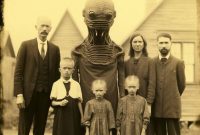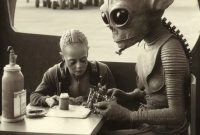In the realm of ufology, certain cases stand out as enduring enigmas, captivating the imagination and sparking debates among skeptics and believers alike. One such incident, etched into the annals of UFO lore, is the Pascagoula River Incident—a chilling encounter that unfolded on a quiet Mississippi night in 1973. As we delve into the details of this extraordinary event and its lasting impact on the study of unidentified flying objects, we embark on a journey that transcends the boundaries of earthly understanding.
The Pascagoula River Incident took place on October 11, 1973, when two fishermen, Charles Hickson and Calvin Parker, reported a harrowing encounter with otherworldly beings near the shores of the Pascagoula River. According to their accounts, the men were fishing peacefully when they were suddenly seized by a blinding light and lifted aboard a strange, metallic craft by humanoid creatures with gray, wrinkled skin and elongated limbs. Terrified and unable to move, they claimed to have been subjected to a series of medical examinations before being returned to the riverbank unharmed.
News of the Pascagoula River Incident spread rapidly, capturing the attention of the public and the media. Amidst a climate of heightened interest in UFOs and extraterrestrial phenomena, the case garnered widespread coverage, drawing both fascination and skepticism from around the world. While some dismissed the fishermen’s accounts as hoaxes or hallucinations, others viewed them as compelling evidence of extraterrestrial visitation—an encounter that defied rational explanation.
Despite intense scrutiny and skepticism, both Hickson and Parker maintained the veracity of their story throughout their lives, enduring scrutiny and ridicule in the process. Their unwavering testimony, coupled with corroborating eyewitness accounts and polygraph examinations, lent credence to the possibility that something truly extraordinary had occurred on that fateful night along the banks of the Pascagoula River.
The legacy of the Pascagoula River Incident endures to this day, serving as a touchstone for researchers, enthusiasts, and skeptics seeking to unravel the mysteries of the cosmos. The case has been studied and analyzed by ufologists, psychologists, and scholars from diverse disciplines, each offering their own interpretations and theories to explain the inexplicable. From hypotheses involving psychological trauma to speculations about interstellar visitors, the Pascagoula River Incident remains an open question, inviting further investigation and exploration.
Moreover, the incident’s impact extends beyond the realm of ufology, touching upon broader questions about humanity’s place in the universe and the nature of our cosmic neighbors. Whether viewed as a cautionary tale, a scientific curiosity, or a profound revelation, the Pascagoula River Incident challenges us to reconsider our assumptions about the unknown and to approach the mysteries of the cosmos with humility and curiosity.
As we reflect on the legacy of the Pascagoula River Incident and its enduring significance in UFO lore, we are reminded of the boundless wonders that await us in the uncharted depths of space. Whether the truth behind this enigmatic encounter will ever be fully revealed remains uncertain, but one thing is clear: the Pascagoula River Incident stands as a testament to the enduring allure of the unknown and the enduring human quest for understanding in the face of the inexplicable.



